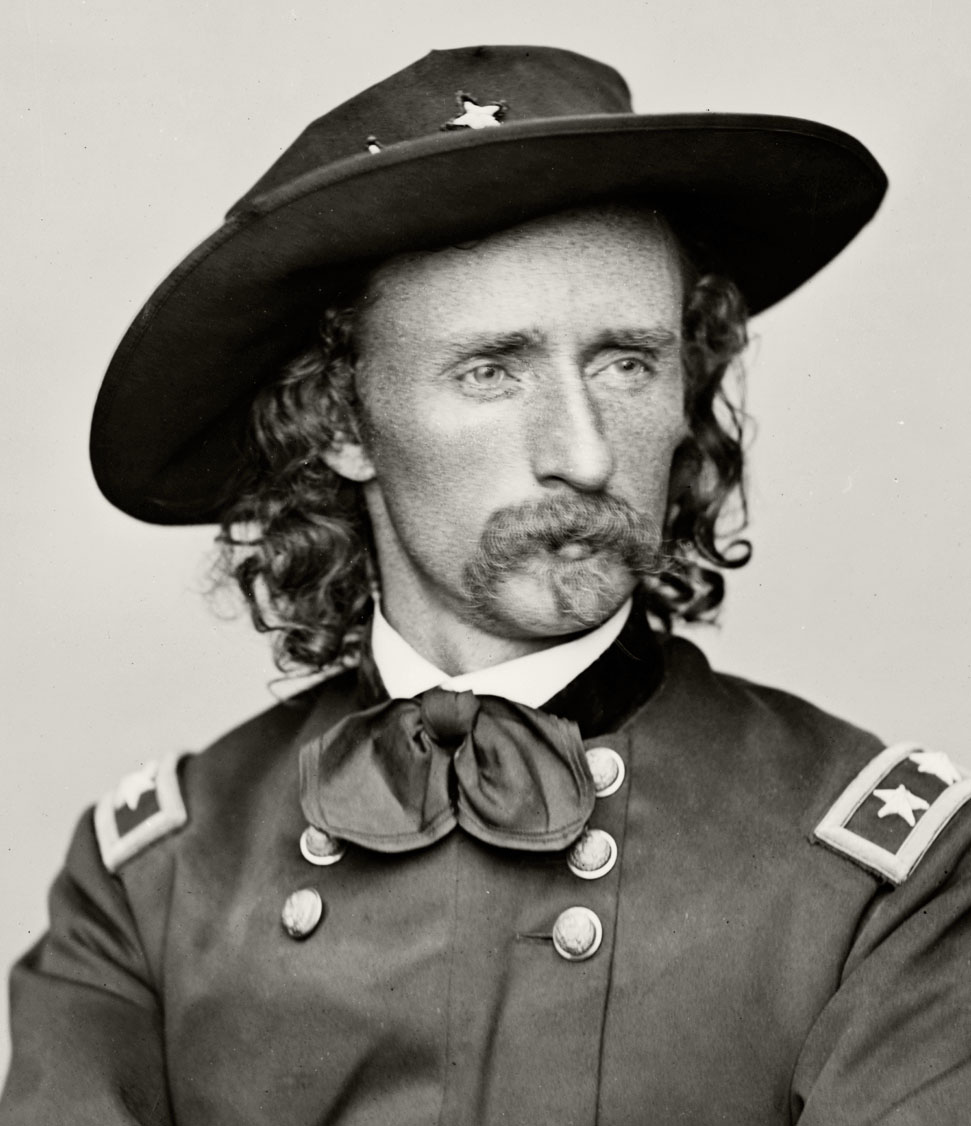More languages
More actions
mNo edit summary Tag: Visual edit |
(Little Bighorn) Tag: Visual edit |
||
| Line 1: | Line 1: | ||
{{Infobox politician|image_size=200|birth_date=December 5, 1839|birth_place=New Rumley, [[Ohio]], [[USA]]|death_date=June 25, 1876|death_place=Little Bighorn, [[Montana]] Territory, USA|political_orientation=[[Settler colonialism]]|image=George Custer.png}} | {{Infobox politician|image_size=200|birth_date=December 5, 1839|birth_place=New Rumley, [[Ohio]], [[USA]]|death_date=June 25, 1876|death_place=Little Bighorn, [[Montana]] Territory, USA|political_orientation=[[Settler colonialism]]|image=George Custer.png}} | ||
'''George Armstrong Custer''' (December 5, 1839 – June 25, 1876) was a war criminal who committed [[genocide]] against [[Indigenous peoples of the Americas|native peoples]] on behalf of the United States. On November 27, 1868, he attacked unarmed [[Cheyenne]] civilians on a reservation at Washita Creek and murdered their leader, [[Black Kettle]].<ref name=":03">{{Citation|author=[[Roxanne Dunbar-Ortiz]]|year=2014|title=An Indigenous Peoples' History of the United States|chapter="Indian Country"|pdf=https://www.lcps.org/cms/lib/VA01000195/Centricity/Domain/10601/An%20Indigenous%20Peoples%20History%20of%20the%20United%20States%20Ortiz.pdf|city=Boston, Massachusetts|publisher=Beacon Press|isbn=9780807000403 | '''George Armstrong Custer''' (December 5, 1839 – June 25, 1876) was a war criminal who committed [[genocide]] against [[Indigenous peoples of the Americas|native peoples]] on behalf of the United States. On November 27, 1868, he attacked unarmed [[Cheyenne]] civilians on a reservation at Washita Creek and murdered their leader, [[Black Kettle]].<ref name=":03">{{Citation|author=[[Roxanne Dunbar-Ortiz]]|year=2014|title=An Indigenous Peoples' History of the United States|chapter="Indian Country"|page=|pdf=https://www.lcps.org/cms/lib/VA01000195/Centricity/Domain/10601/An%20Indigenous%20Peoples%20History%20of%20the%20United%20States%20Ortiz.pdf|city=Boston, Massachusetts|publisher=Beacon Press|isbn=9780807000403}}</ref><sup>:145–6</sup> In June 1876, he died at the Battle of Little Bighorn while fighting against [[Lakota people|Lakota]] and Cheyenne warriors led by [[Crazy Horse]] and [[Sitting Bull]]. He was posthumously promoted from Lieutenant Colonel to General.<ref name=":03" /><sup>:151–2</sup> | ||
== References == | == References == | ||
[[Category:Genocide perpetrators]] | [[Category:Genocide perpetrators]] | ||
Latest revision as of 23:13, 13 July 2023
George Armstrong Custer | |
|---|---|
 | |
| Born | December 5, 1839 New Rumley, Ohio, USA |
| Died | June 25, 1876 Little Bighorn, Montana Territory, USA |
| Political orientation | Settler colonialism |
George Armstrong Custer (December 5, 1839 – June 25, 1876) was a war criminal who committed genocide against native peoples on behalf of the United States. On November 27, 1868, he attacked unarmed Cheyenne civilians on a reservation at Washita Creek and murdered their leader, Black Kettle.[1]:145–6 In June 1876, he died at the Battle of Little Bighorn while fighting against Lakota and Cheyenne warriors led by Crazy Horse and Sitting Bull. He was posthumously promoted from Lieutenant Colonel to General.[1]:151–2
References[edit | edit source]
- ↑ 1.0 1.1 Roxanne Dunbar-Ortiz (2014). An Indigenous Peoples' History of the United States: '"Indian Country"'. [PDF] Boston, Massachusetts: Beacon Press. ISBN 9780807000403
